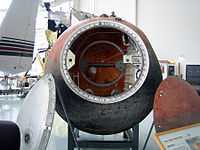Foton (satellite)
Foton (or Photon) is the project name of two series of Russian science satellite and reentry vehicle programs. Although unmanned, the design was adapted from the manned Vostok spacecraft capsule. The primary focus of the Foton project is materials science research, but some missions have also carried experiments for other fields of research including biology. The original Foton series included 12 launches from the Plesetsk Cosmodrome from 1985 to 1999. The second series, under the name Foton-M, incorporates many design improvements over the original Foton, and is still in use. So far, there have been four launch attempts of the Foton-M. The first was in 2002 from the Plesetsk Cosmodrome, which ended in failure due to a problem in the launch vehicle. The last three were from the Baikonur Cosmodrome, in 2005, 2007, and 2014; all were successful. Both the Foton and Foton-M series used Soyuz-U (11A511U and 11A511U2) rockets as launch vehicles.
Reentry
The Foton capsule has limited thruster capability. As such, the reentry path and orientation can not be controlled after the capsule has separated from the engine system. This means that the capsule has to be protected from reentry heat on all sides, thus explaining the spherical design (as opposed to Project Mercury's conical design), which allows for maximum volume while minimizing the external surface. However, the lack of lift means the capsule experiences high forces on reentry, up to 8 to 9g.
ESA participation
Starting with the Foton-7 mission, the European Space Agency has been a partner in the Foton program.[1]
Foton launches
| Designation |
Launch Date |
Recovery Date |
Mission Payload(s) |
Notes |
| Foton-1 |
1985-04-16 |
? |
|
|
| Foton-2 |
1986-05-21 |
? |
|
|
| Foton-3 |
1987-04-24 |
? |
|
|
| Foton-4 |
1988-04-14 |
? |
|
|
| Foton-5 |
1989-04-26 |
? |
|
|
| Foton-6 |
1990-04-11 |
? |
|
Re-entry capsule on display at the Evergreen Aviation Museum in McMinnville, Oregon, USA[2] |
| Foton-7 |
1991-10-04 |
? |
|
|
| Foton-8 |
1992-10-08 |
? |
|
|
| Foton-9 |
1994-06-14 |
? |
|
|
| Foton-10 |
1995-02-16 |
? |
|
|
| Foton-11 |
1997-10-09 |
? |
|
|
| Foton-12 |
1999-09-09[3] |
1999-09-24[3] |
|
Re-entry capsule on display at the European Space Research and Technology Centre in Noordwijk, Netherlands[4] |
| Foton-M1 |
2002-10-15 |
N/A |
|
Lost due to a launch failure |
| Foton-M2 |
2005-05-31 |
2005-06-16 |
|
|
| Foton-M3 |
2007-09-14 |
2007-09-26 |
Young Engineers' Satellite 2 |
|
|
| Foton-M4 |
2014-07-18 |
2014-09-01 |
|
Planned two-month mission was reduced to 44 days due to communications failure after launch and a missed rocket burn to the planned 575-kilometer (357-mile) orbit. Five geckos, launched to track their sexual habits in space, died during the mission.[5] |
See also
References
External links
|
|---|
| | Disciplines | |
|---|
| | Topics | |
|---|
| Space
missions | Earth satellites | |
|---|
| Mars missions | |
|---|
| Proposed | |
|---|
| Cancelled | |
|---|
|
|---|
| | Related | |
|---|
|
-
 Category Category
-
 Portal Portal
|
|
|
|---|
| | Foton |
- Kosmos 1645
- 1744
- 1841
- Foton No.4
- 5
- 6
- 7
- 8
- 9
- 10
- 11
- 12
|
|---|
| | Foton-M | |
|---|
|
